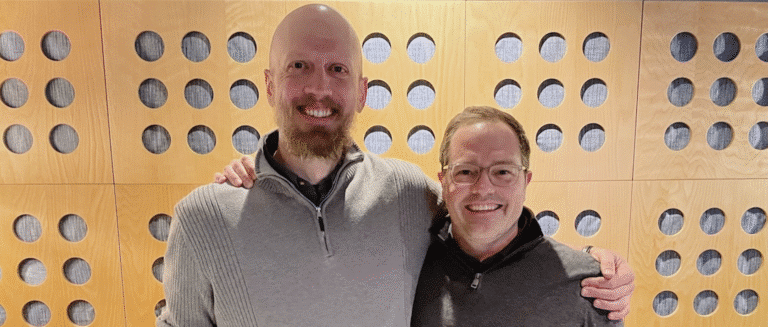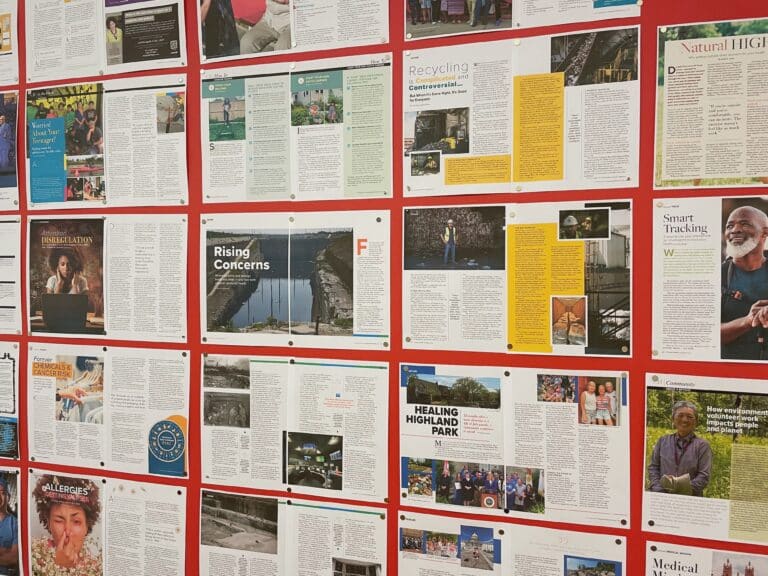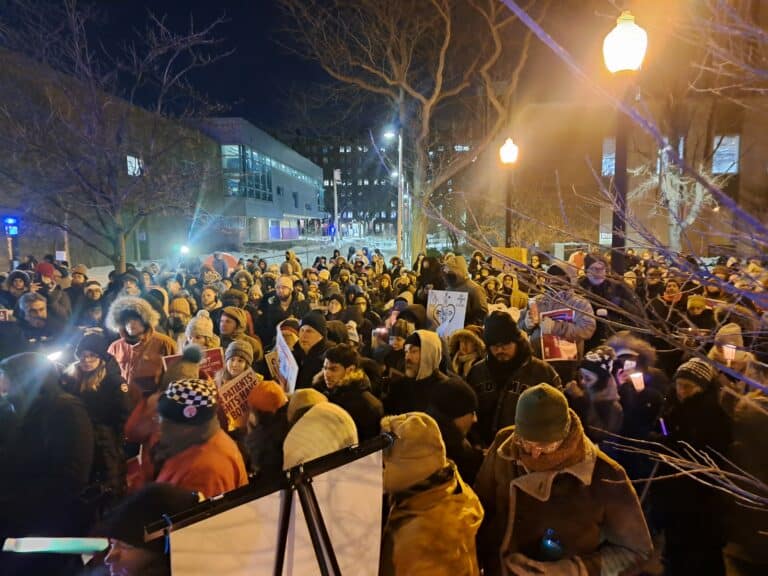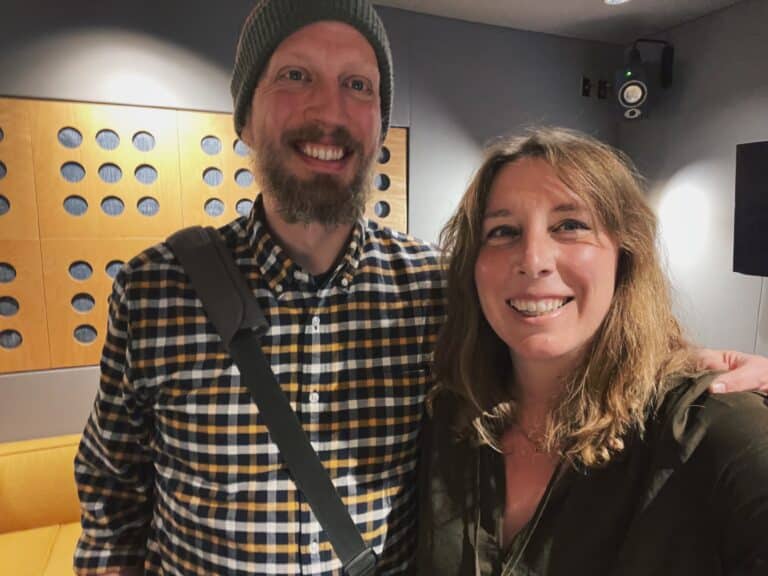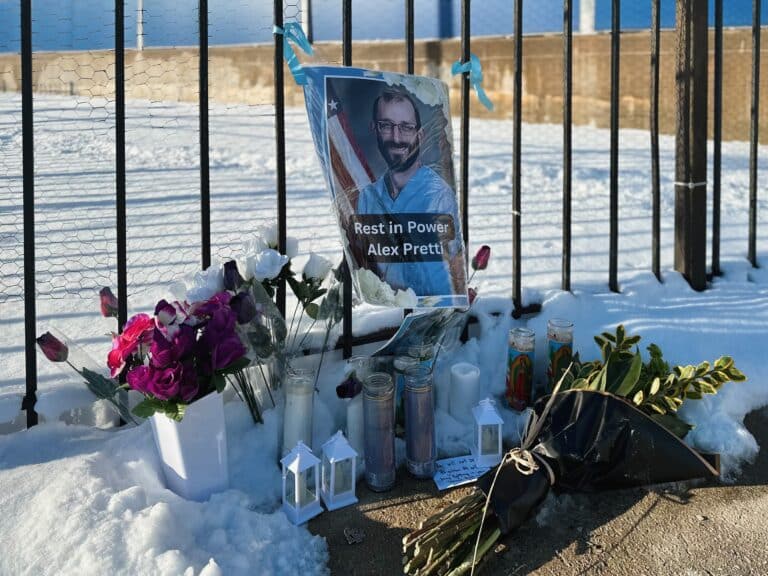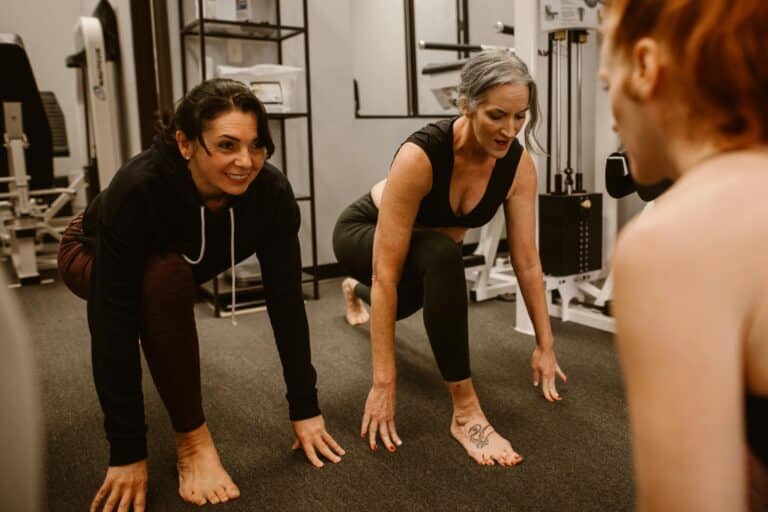The groups taking on gun violence directly — and how their efforts are evolving Chicago
America’s weak gun control laws mean guns are everywhere. That’s where four unique local groups play a vital role. The groups operate separately and use different methodologies, but all four have the same fundamental goal: to stop violence from happening. Whether they do that by deploying people to de-escalate situations on the streets, by lobbying for more legislation, or by supporting victims of violence and their families as soon as injuries occur, depends on the organization. But they all play an important role in public safety, public health, and the future of our communities.
Choose to Change
Where once violence may have seemed like the only answer, Choose to Change (C2C) is working to equip young people to make better choices. And they’re doing this work with teens in under-resourced communities, where gun violence disproportionally affects young people.
The University of Chicago’s Crime Lab, in partnership with Brightpoint and Youth Advocate Programs, Inc., developed C2C.
“Youth growing up in segregated and low-income neighborhoods are much more likely to experience trauma and exposure to violence,” says Nour Abdul-Razzak, a research director at the University of Chicago Inclusive Economy Lab and an affiliate at UChicago Crime Lab. “This constant exposure impacts how they respond under stress.”
C2C works to reduce youth violence through trauma-informed therapy and intensive mentoring. The organization strives to support at-risk youth before they encounter a violent situation.
During the six-month program, mentors meet with individuals on a one-to-one basis for at least eight hours a week. “They’re building strong interpersonal bonds to highlight each young person’s strengths and address their specific needs,” Abdul-Razzak says. C2C therapists also lead weekly trauma-informed therapy group sessions.
Abdul-Razzak cites research showing the effectiveness of mental and behavioral health supports to uplift at-risk youth. “These types of interventions teach them to slow down reactions and use alternative responses,” she says.
The Crime Lab’s study on C2C’s effectiveness shows a significant drop in rates of violent crimes among young people who complete the program. But the most powerful endorsement comes from participants themselves.
In talking about the impact of having a mentor, one young man said his mentor had “been there, done that; he’d been my age before. But I hadn’t ever been his age, and I’m trying to get there.”
Another participant embodied the program’s ultimate goal. “I learned how to walk away, not act on everything, and not make a permanent decision on a temporary situation.” —Rebecca Stiles
Chicago CRED
Chicago CRED, which began in 2016, puts the power of stopping gun violence into community members’ hands. Former U.S. Secretary of Education Arne Duncan started the effort with Laurene Powell Jobs, who had experience founding another social impact organization called Emerson Collective. Their goal: to steer people away from violent situations.
Initiatives include street outreach, therapy, life coaching, job training, and employment. But one of the programs where CRED has seen great success so far is FLIP (Flatlining Violence Inspires Peace). FLIP recruits men and women who live in gun violence hot spots in Chicago and the south and west suburbs to act as peacekeepers.
“Peacekeepers have credibility and influence because they are from those hot spots and are willing to leverage their credibility and influence to bring about peace in those areas,” says Jalon Arthur, director of strategic initiatives at CRED.
FLIP participants receive a daily stipend and training on how to mediate conflicts within their four to five block areas. They also learn how to set up non-aggression agreements between groups in conflict. “This is about getting both groups to agree to stand down and stop back-and-forth violence,” Arthur says.
Initially, the FLIP program was privately funded, and peacekeepers only worked during the summer months. It has since spread to other communities, and in 2023, the Office of Firearm Violence Prevention, part of the Illinois Department of Human Services, began funding it. Today, there are about 1,100 peacekeepers in 14 communities across the Chicago area; they work year-round.
Researchers at Northwestern University analyzed the FLIP program’s performance from July through December 2023. Across the 14 communities, peacekeepers mediated 630 conflicts.
The program also provides opportunities for the peacekeepers. More than 200 have transitioned into full-time community violence intervention work as street outreach workers, case managers, and victim advocates.
As peacekeepers work their blocks, Arthur sees hope for Chicago. “The whole thought behind FLIP is that if we can cool down the hot spots that draw the lion’s share of shootings, then we can help cool down the communities themselves. And as we scale to more and more impact in the communities, then we have an opportunity to cool down the city as a whole.” —Cathy Cassata
Healing Hurt People Chicago
In the level I trauma unit at John H. Stroger, Jr. Hospital, people caught in the crosshairs of gun violence get care for more than their physical wounds. Healing Hurt People Chicago — a hospital-based, violence intervention program — treats the emotional scars that can contribute to retaliation and reinjury.
The program started 11 years ago, after a study found 43% of Stroger’s gun violence patients and 39% of the patients’ loved ones had post-traumatic stress disorder (PTSD). In the general population, PTSD is 6%.
“That kind of depression and anxiety and suspicion and isolation — all those things have a negative impact on people’s ability to take care of the business of their families,” says Carol Reese, MDiv, co-founder of Healing Hurt People Chicago. Reese is a licensed clinical social worker and hospital chaplain. “We provide practical care and mental health support to help folks stabilize after their injury.”
Each year, Stroger’s trauma unit sees 600 to 900 gun violence patients. Almost as soon as they arrive, Healing Hurt People social workers provide psychological first aid.
“If we can intervene right away, either with the person who’s injured or with their family, then we can save a life in essence by helping with resources that people need for healing after they’ve had a pretty devastating injury,” Reese says.
About 250 patients need longer-term support through Healing Hurt People’s outpatient program. Peer-led support groups and ongoing case management help address life stressors, such as economic insecurity, abusive relationships, or unsafe housing — all of which can contribute to further gun violence.
The free program, funded by Cook County Health, donations, and outside grants also receives referrals from Comer Children’s Hospital at University of Chicago. Of participants who have engaged with the program six months or longer:
· 92% remained safe (no new injury).
· 81% had no new criminal justice involvement.
· 77% had a decrease in PTSD symptoms from baseline.
Healing Hurt People also measures success by whether case managers help patients achieve their goals, such as getting a job, finding safe housing, or going back to school. “We spend a lot of time building relationships with folks we work with and finding out whatin fact is important to them,” Reese says. —Rita Colorito
Moms Demand Action
After a gunman opened fire at Sandy Hook Elementary School in December 2012, Shannon Watts — a mother of five — turned to social media to mobilize women across the country. What began as a Facebook post has evolved into Moms Demand Action (now part of Everytown for Gun Safety). The nationwide organization has 10 million members in chapters across the country. Chicago’s chapter, which has almost 19,000 members, is tackling gun violence through lobbying as well as showing up in communities and for each other.
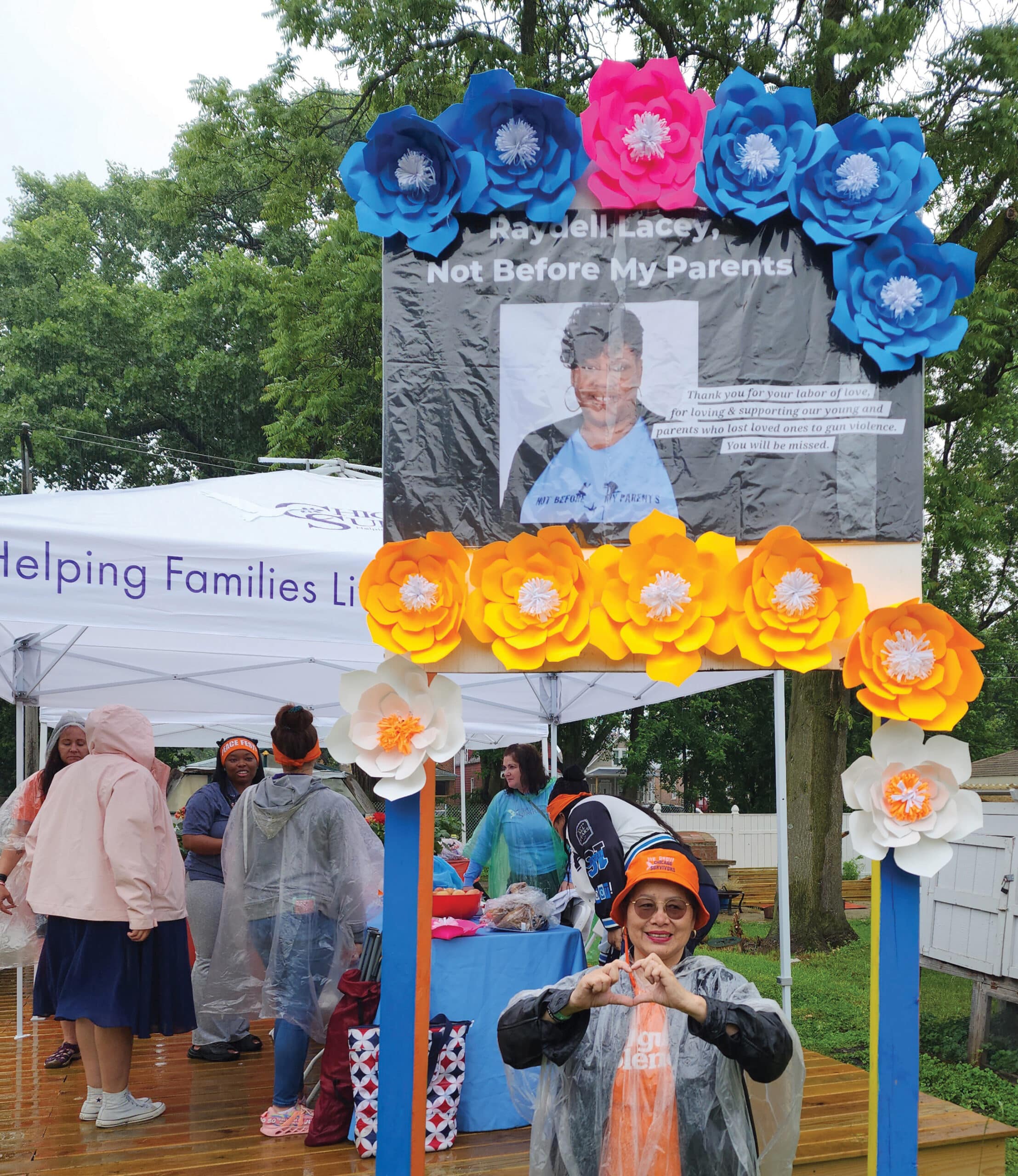
Maria Pike is the organization’s City Gun Violence chapter lead for Chicago and Illinois. Her commitment to the cause is personal; she lost her son Ricky to gun violence in August 2012.
“I knelt on my knees on December 14, 2012, when the Sandy Hook shooting happened, when I realized no one is immune from gun violence,” Pike says. “I promised I would do everything possible to stop this madness.”
Since then, Pike has worked alongside other mothers to push for legislation to address gun violence, scoring some notable recent victories. Last year, the White House established the first Office of Gun Violence Prevention, and Illinois passed the Protect Illinois Communities Act, regulating the sale and distribution of assault weapons and high-capacity magazines. Ten Moms Demand Action volunteers also assumed elected office across Illinois in 2023.
Members actively participate in the communities where they live, too, collaborating with churches, survivor families, and other stakeholders. They hold back-to-school giveaways, provide food, offer tutoring, and more. They also encourage responsible gun ownership.
Pike says that members who live in Chicago tend to experience gun violence differently than those who live in the suburbs. Suburban moms typically join the movement after a mass shooting such as the one in Highland Park in 2022; some Chicago communities cope with homicides on a daily basis. Urban families also suffer from systemic issues that lead to more gun violence, such as poverty; lack of food; and lack of high-quality education, housing, and job opportunities.
Though their life circumstances may vary, members throughout the Chicago area find spaces to gather to discuss gun violence prevention and keep each other energized.
“Through the years and discussions, we began to see eye to eye and began supporting each other,” Pike says. “We do the work; we get tired; we pass the baton to someone else.” —Kirsten Lambert

